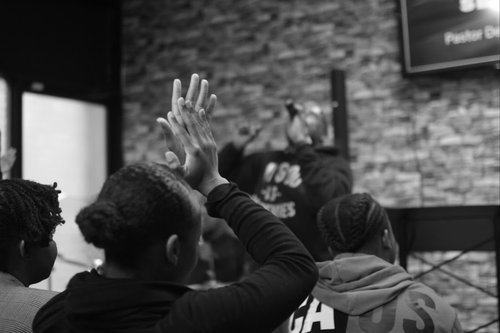Welcoming Worship: A Conversation with MyGeneration Church
Best Practices for Adventist Worship (BP): MyGeneration Church is an Adventist church plant in Central Harlem. Perhaps even more remarkable than the fact that it's comprised largely of young adults, it's also a neighborhood church where folks walking by can walk in and feel right at home. As local church leaders, what have you done to make the worship gatherings so accessible to your fellow New Yorkers?
MyGeneration (MG): It is important to MyGen leaders that we are not just a church in Harlem, but we are a movement working to change lives in Harlem. We are very intentional with our worship—from our mid-day start time to our casual dress, snacks, welcome activities, interactive prayers, music, and fellowship. Our non-traditional services take place in a relaxed setting where people can feel comfortable, as if they have known us for years. We want every new visitor to feel at home.
At least once a quarter, MyGen replaces the regular church service with service day, where we help to address needs within our community. We have canvassed the neighborhood with petitions to help keep residents in their homes. We have created blessing bags, filled with toiletries, and handed them out to those who were in need. In August, we conducted a back-to-school drive where we distributed book bags filled with school supplies for elementary students.
We recently asked members and visitors what attracted them to MyGen and what keeps them coming. They provided the following reasons:
Authentic worship experience ("no stench of legalism")
Sociability (e.g., game nights and social outings)
Intimate setting where no one can feel lost
Culture of love (“as you walk in you feel loved even if you're not Seventh-day Adventist)
Ability to get involved (other churches can feel like an exclusive club where you need to know someone)
Comfortability in dress and worship (you can come as you are)
Feeling of being valued
BP: Could you share a recent story of a neighbor who was able to become genuinely integrated into the community?
MG: A few sabbaths ago, a gentleman was passing by, heard the praise team singing, and peeked through the window. We waved and invited him in. Once inside, we asked his name and prayed for him. He then felt comfortable enough to sit down and join our service. To our surprise, he was very engaged during praise and worship and sang with a wonderful, soulful voice. During our financial freedom segment, one of our members handed him the microphone to sing a solo as the offering basket was passed around. He went up to the front, sang part of a gospel song he wrote, and gave a testimony while the MyGen family supported him.
After service, we got to know him a bit better. He loves music and inquired about potentially joining the praise team. He has never heard of Seventh-day Adventism, so we explained a bit and invited him to attend our Scripture study to learn more about the Bible.
Since that sabbath, this gentleman has joined our Bible study, attended a few services, and sat in on a few praise team rehearsals. We are in the process of getting to know him better and developing a relationship with him. We have invited him to participate in our music day in January. So far, he has chosen a song, and we have plans to rehearse it with him leading up to his solo.
As a progressive movement, one of our goals at MyGen is to reach people who would not typically walk into a traditional church setting. We are proud to be the church where these experiences happen.
BP: As church leaders, we seek to gather in ways that cultivate community beyond the church walls and current membership. But we often face a tendency to be insular. If a congregation is just starting to ask how they can be an inclusive community for their neighbors, what would you suggest is the most helpful place to begin?
MG: We believe that the most helpful place to begin is with a change in mindset. Many of us have been raised with a misunderstanding of 1 Peter 2:9. When the Apostle said, "Ye are a chosen generation, a royal priesthood, an holy nation, a peculiar people," he was not giving Christians permission to place themselves in an exclusive group above others. He was not telling us to disassociate with unbelievers. The second part of the text says that our responsibility is to show others the goodness of God. We cannot do that if we only minister to ourselves. The way we begin to attract neighbors into our church is by wanting them there and actually being prepared to welcome them, without judgment, when they come. People know when they are not wanted. They can feel when they are being tolerated or used to check a box. They can also feel when the hospitality they receive is given out of obligation. We need to ask God for the ability to love others. Once the love is there, everything else will fall into place.

